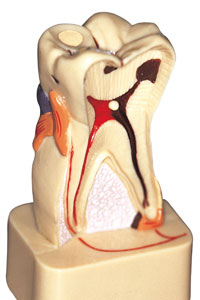 Out of all the dental procedures you could undergo as a patient, root canal treatment seems to be the one that makes the most people cringe in fear. Maybe that’s because of the longstanding rumor about it being unbearably painful, or simply because it’s a long procedure that seems incredibly invasive. Whatever the case is, root canals are not as bad as they’ve been built up to be over time. In fact, they’re a crucial and effective treatment that can save your natural teeth from having to be extracted due to extensive decay or infection.
Out of all the dental procedures you could undergo as a patient, root canal treatment seems to be the one that makes the most people cringe in fear. Maybe that’s because of the longstanding rumor about it being unbearably painful, or simply because it’s a long procedure that seems incredibly invasive. Whatever the case is, root canals are not as bad as they’ve been built up to be over time. In fact, they’re a crucial and effective treatment that can save your natural teeth from having to be extracted due to extensive decay or infection.
Are you suffering from one or more of these symptoms?
- Severe tooth pain when chewing
- Prolonged sensitivity to excessively hot or cold temperatures
- Your tooth has darkened a shade
- Swollen or tenderness in the gums
- A persistent pimple on the gums that keep recurring
If so, then you may be in need of root canal treatment.
When undergoing a root canal procedure, your dentist or endodontist will first take X-rays so as to see if there are any infections in the bone that surrounds your tooth. Then, a hole will be drilled into the affected tooth and the pulp, bacteria, decayed nerve tissue, and related debris will be cleaned out. Your tooth is then sealed, either directly after the cleaning or at a second appointment in a week, depending on your dentist’s preferences (if if it’s the latter, you’ll be provided with a temporary filling to keep out contaminants). All that’s left after that step is for your dentist to see if any further restoration is needed to restore your tooth to full functionality.
Root canal treatment is highly successful, and many teeth that have undergone a root canal last a lifetime. Additionally, a root canal doesn’t hurt anymore than a common filling does, according to most people.
In the case of a root canal, seeking immediate treatment is crucial if you want to save your natural tooth. Call your local dentist if you’re exhibiting any of the symptoms above, or if you have any questions about the procedure.

